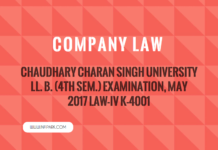State briefly the facts and the legal principles laid down in leading case–Saloman v. Salomon and Co. Ltd., (1987) A.C. 22.
Ans. Facts.—Salomon had a business of leather and wholesale boot manufacture. He sold this business of his to a company which he formed with a capital of £40,000. The necessary seven persons for the constitution of the company were exclusively his family members, i.e., Salomon, his wife, daughter and four sons. The price paid by the company to Salomon lbr the purchase of his old business was £30,000. This amount was not paid in cash to him but the company issued 20,000 fully paid £1 shares and £10,000 in debentures (charge with security). Each remaining member of Salomon family took one £1 share. Salomon with his two sons constituted the board of directors of the company.
Because of the strikes in the boot trade, the Company was wound up it the time when the total assets of the Company were valued at £6,000 and the liabilities £ 10,000 due to Salomon which was secured by debentures, and a further sum of £7,000 was due to unsecured creditors..
The unsecured creditors claimed that a Soloman and Co. Ltd., was really Solomon under another name, Soloman could not owe money to himself and that they should be paid £7,000 in preference to Solomon himself. The court below held that, “The Act contemplated the incorporation of seven independent bona fide members, who had a mind and a will of their own, and were not the mere puppets of an individual, who adopting machinery of the Act, carried on his old business in the sonic way as before, when he was a sole trader. To legalize such transaction would be scandal.”
The following observations we are made by their Lordships–
(i) In order to form a company limited by shares a Memoran dum of Association should be signed by seven persons;
(ii) Every such person should possess at least one share each;
(iii) If above mentioned requirements are complied with it hardly makes any difference whether the signartories are relations or strangers;
(iv) The company is at law a different person together from the subscribers of the memorandum;
(v) The statute enacts nothing as to the extent or degree or interest which may be held by each of the members;
(vi) There is nothing in the Ac; requiring that the subscribers to the memorandum of Association should be independent or unconnected or that they should have mind or will of their own;
(vii) Act does not require anything like a balance of power in the constitution of the company. Decision Keeping in view the facts of the case the court decided that an individual may hold practically all shares in a company either by himself or through his nominee to control the company in the sense that it may enable him to turn out the directors and to enforce his own views as to policy by exercising his own voting powers. This mode does not, in any way, diminish the rights or powers of the directors nor the property or assets of the company became that of the shareholder of a company. The properties and assets remain to be the property of the company. Thus, the claims of Salomon were referred to the claims of other unsecured creditors.



















